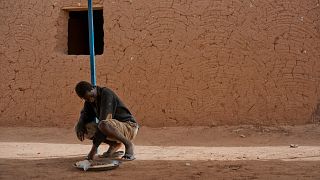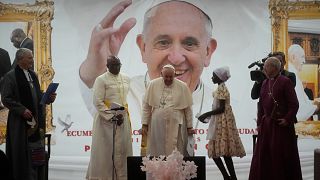Presidential elections
Benin's President Patrice Talon looks set to win re-election to a second term on Sunday in a presidential ballot critics say is already tilted in his favour after a crackdown on opponents.
A cotton tycoon first elected in 2016, Talon faces two little-known rivals with most opposition figures from the West African country either living in exile or disqualified from running in the election.
Protests broke out this week in several towns, mainly in opposition strongholds, as tensions built before Sunday's vote with young demonstrators blocking roads and ransacking pro-government property.
Once praised as a vibrant multi-party democracy in an often troubled region, critics say Benin has slipped into authoritarianism under Talon as his political foes were steadily sidelined.
Slotted between Africa's powerhouse Nigeria and tiny neighbour Togo, Benin has seen some economic successes in five years under Talon, with improved roads, water and energy supplies. But analysts say its pluralist politics are now dimmed.
Talon has played up his economic programmes while campaigning. At the start of the pandemic he said he could not enforce public confinement because Benin lacked the means of rich countries.
"I have to work for the whole country. The work that we started will have to be finished," Talon said at an April campaign stop in Avrankou, near the capital Porto-Novo.
In final days of campaigning, the economic capital Cotonou was adorned with blue posters of Talon and his running mate for the vice-presidency, Mariam Talata.
On the new roads, a few electoral caravans trundled along to the din of music and horns. But the usual fervour of presidential campaigns was missing.
"Since the return of the multiparty system in 1990, this is the first time the country has organised a presidential election like this: pluralist in appearance, but without choice in reality," said Expedit Ologou, a Beninese political scientist.
"And where the re-election of the president seems only a formality."
- Marxism to crackdown -
Following 17 years of military rule along Marxist-Leninist lines, the former French colony opened up into a multi-party democracy in 1990.
But since Talon won power in 2016 as an independent candidate, critics say he has used a special economic crimes and terrorism court and electoral reforms as tools to disqualify the opposition.
Still fresh in the memories of many is the political crisis that followed a disputed parliamentary election in April 2019. Tensions erupted into mass opposition protests that were broken up when security forces opened fire with live rounds.
Parties allied to Talon won all the seats after opposition groups were effectively banned. Some figures then fled into exile.
An amendment to the electoral law in 2019 also required presidential candidates to be sponsored by at least 16 deputies or mayors. Only 6 of these 159 elected officials belong to an opposition party.
That meant election officials disqualified many opposition figures from running in Sunday's vote because they lacked the required documents.
Only two opposition candidates were approved: former minister Alassane Soumanou and Corentin Kohoue, a dissident candidate from the opposition Democrats party.
Supporters of Talon say the country's democratic credentials are intact and that Sunday's elections will go ahead without any problems.
"Even though his record is very positive, an election is never won in advance," said Talon's communications director Wilfried Houngbedji. "An election must be a party."
Analysts say low turnout could be a real issue.
"Patrice Talon does not want to be elected with 20 or 30 percent of the vote, as was his assembly," said local political analyst Mathias Hounkpe.
Tensions have been on the rise in the weeks before the vote. A leading opposition member was arrested accused of trying to destabilise the election.
This week, a judge from the special economic crimes and terrorism court fled the country claiming to have been pressured by the government to seek charges against opponents.
The government dismisses such accusations as "political manipulation" and claimed exiled figures were trying to have the election annulled.
"Yes there are risks of tensions, but Beninese have in mind the violent political crisis that followed the 2019 parliamentary elections," analyst Hounkpe said, "and many are afraid."












Go to video
Tanzania opposition says jailed leader not seen by family, lawyers
Go to video
Tunisia jails opponents, critics of President Saied
Go to video
Uganda plans law to allow military prosecution of civilians
Go to video
Tanzania opposition protests election ban
01:02
Former Guinean junta leader Moussa Dadis Camara leaves country for medical reasons
Go to video
Gabonese react to Brice Oligui Nguema's landslide presidential election election